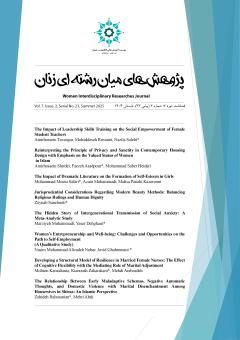Reinterpreting the Principle of Privacy and Sanctity in Contemporary Housing Design with Emphasis on the Valued Status of Women in Islam
Subject Areas :
Amir Shirdel
1
![]() ,
Faezeh Asadpour
2
,
Faezeh Asadpour
2
![]() ,
Mohammad Saber Heidari
3
,
Mohammad Saber Heidari
3
1 - Undergraduate Student, Faculty of Architecture and Urban Planning, Shahid Rajaee Teacher Training University, Tehran, Iran.
2 - Assistant Professor, Department of Architecture, Faculty of Architecture and Urban Planning, Islamic Azad University, North Tehran Branch, Tehran, Iran
3 - Master’s Student, Faculty of Art and Architecture, Tarbiat Modares University, Tehran, Iran.
Keywords: Privacy, Sanctity, Iranian Housing, Contemporary Housing, Women, Islamic Architecture.,
Abstract :
The principle of privacy and sanctity in sustainable housing design has gained increasing attention due to the diverse social and cultural challenges facing contemporary societies. Housing, beyond serving as a physical shelter, plays a crucial role in shaping and reinforcing individual and social identities, particularly for women. In Islamic societies, the concept of privacy is considered a fundamental value in family and social relations, and emphasizing it can enhance quality of life, security, tranquility, and psychological well-being within families. Therefore, addressing privacy in housing design and its impact on individuals' quality of lifeespecially that of women—is deemed a critical necessity in this research. Privacy, as a key element in fostering healthy and balanced communities, strengthens family relationships and reduces social tensions. Accordingly, designing residential spaces that prioritize personal needs while preserving privacy can provide women with secure and peaceful environments, enabling them to effectively fulfill their social roles.This study, conducted using a qualitative, descriptive-analytical approach, through an extensive review of the literature and theoretical data analysis, concludes that adherence to privacy principles in housing design not only improves individuals' quality of life but also promotes social interactions. Creating residential spaces that meet privacy needs can foster social cohesion and reduce social problems. The findings further reveal that attention to zoning, spatial hierarchy, and related architectural strategies significantly contributes to fulfilling privacy requirements within homes.It is noteworthy that this research can serve as a foundation for improving housing design and enhancing quality of life in Islamic societies, ultimately leading to the creation of healthier and more sustainable environments for all individuals, particularly women.
